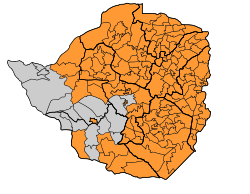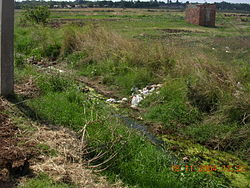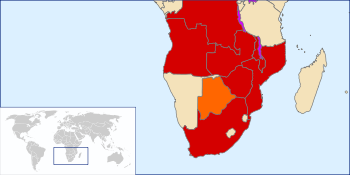- Zimbabwean cholera outbreak
-
The Zimbabwean cholera outbreak is an ongoing cholera epidemic in Zimbabwe that began in August 2008, swept across the country[6] and spread to Botswana, Mozambique, South Africa and Zambia.[7][8] By 10 January 2010 there had been 98,741 reported cases and 4,293 deaths making it the deadliest African cholera outbreak in the last 15 years.[9][10] The Zimbabwean government declared the outbreak a national emergency and requested international aid.[11]
Contents
Causes
The principal cause of the outbreak is lack of access to safe water in urban areas and communities. A unique feature of Zimbabwe is that its two main cities are located on watershed divides, which means that the water draining out of the city flows into the drinking water sources, all of which are physically located downstream of these return flows.[12] This is exacerbated by the collapse of the urban water supply,[13] sanitation[14] and garbage collection systems,[15] along with the onset of the rainy season leading to faeces with cholera bacteria being washed into water sources, in particular public drains,[16] as well as providing readily available but contaminated water.[17] Due to a shortage of purification chemicals, such as chlorine, the capital city of Harare stopped receiving piped water on 1 December 2008.[18] By that date, many suburbs had not had any water supply for much longer.[19] On 4 December 2008, the Zimbabwe deputy minister for water and infrastructural development stated that there were only sufficient treatment chemicals in stock nationally for twelve weeks supply.[20] The collapse of these systems has frequently been blamed on the current economic crisis.[21][22] Attempts have also been made to attribute the blame to colonial rule, although Zimbabwe had become a fully independent nation 28 years earlier, in 1980.[23] Many households cannot even afford sufficient fuel to boil all of their water.[24] According to Médecins Sans Frontières, the spread of cholera from urban to rural areas from December 2008 onwards was due to infected city-dwellers visiting their families' rural homes for Christmas and the burial of infected city-dwellers in rural areas.[25]
The cholera epidemic in Zimbabwe has had an unusually high fatality rate. According to Oxfam, "this is due to the fact Zimbabweans are seriously weakened by hunger, HIV and AIDS".[24]
A major contributing factor to the severity of the outbreak is the collapse of Zimbabwe's public health system, declared a national emergency on 4 December 2008.[26] By the end of November 2008, three of Zimbabwe's four major hospitals had shut down, along with the Zimbabwe Medical School, and the fourth major hospital had two wards and no operating theatres working.[27][28] Zimbabwean hospitals still open by December 2008 lacked medicines and staff. Due to hyperinflation, hospitals were not able to buy basic drugs and medicines, and the resources of even internationally-funded emergency clinics are stretched.[17] The ongoing political and economic crisis also contributed to the emigration of the doctors and people with medical knowledge.[29] Some victims were travelling to Botswana and other neighbouring countries for treatment.[21]
Impact
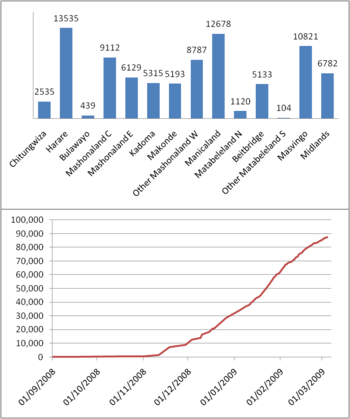 The spread of cholera in Zimbabwe: (top) The number of cases recorded in the most infected centres and districts, and in the remainder of each province of Zimbabwe as of 4 March 2009. (bottom) Total number of reported cases. Since totals for many districts are not updated daily, the first occurrence of a case may represent the date of the reporting of that case, not the date of infection. Data sources: United Nations Office for the Coordination of Humanitarian Affairs,[1] the World Health Organisation,[5] the International Federation of Red Cross and Red Crescent Societies.[2][30] and news media,[14][18][31][32][33][34]
The spread of cholera in Zimbabwe: (top) The number of cases recorded in the most infected centres and districts, and in the remainder of each province of Zimbabwe as of 4 March 2009. (bottom) Total number of reported cases. Since totals for many districts are not updated daily, the first occurrence of a case may represent the date of the reporting of that case, not the date of infection. Data sources: United Nations Office for the Coordination of Humanitarian Affairs,[1] the World Health Organisation,[5] the International Federation of Red Cross and Red Crescent Societies.[2][30] and news media,[14][18][31][32][33][34]
The outbreak began in Chitungwiza on 27 August 2008, with the first case in Harare reported four days later. The next district to report cholera was Kariba on 21 September 2008, with Makonde following on 3 October 2008.[1] Thereafter, the disease spread to reach all of Zimbabwe's ten provinces.[1][15] The attack rate was highest in Beitbridge, Chegutu, Mudzi and Zvimba Districts (above 1,000 cases per 100,000 people or 1.0%).[5]
The number of infected cases reported by the United Nations Office for the Coordination of Humanitarian Affairs escalated from 30 on 1 September 2008[35] to 15,572 by 10 December.[32] It was argued by some agencies that the reported number of cases probably under-estimated the extent of the outbreak, since many people were unlikely to have reached the clinics or treatment where the numbers were recorded. According to the Red Cross, around 46% of reported deaths occur en route to clinics and hospitals.[36] The head of the British Department for International Development in Harare said that "there are probably twice as many people with cholera as turn up for treatment."[37]
The case fatality rate for the outbreak was higher than expected for such outbreaks, although it began declining by January 2009.[5] Official estimates of fatalities have run from 484 to 800, since the outbreak in August 2008,[38] with an upper estimate of 3,000 from an anonymous senior official in the Ministry of Health and Child Welfare.[19] Fatality rates varied from 2.5% in Harare to 18% in Chitungwiza.[39] In Harare, the crisis reached the extent that the city council offered free graves to cholera victims.[16] On 4 December, Oxfam estimated that by the end of March 2009, some 60,000 would be infected.[22] By 7 December, Oxfam had revised their estimate to 60,000 cases by the end of January 2009 and a 10% fatality rate,[24] with UNICEF giving a similar estimate.[40] On 4 December 2008, the Zimbabwe government declared the outbreak to be a national emergency.[26]
Politicisation
As the outbreak and health crisis grew worse, American and British leaders cited the crisis as further proof that it was, in their view, "well past time for (President) Robert Mugabe to leave"[41] and that Zimbabwe had become a failed state.[42] The Zimbabwe government and state media responded by blaming the outbreak on European and American sanctions[43] and accused Britain of plotting an invasion under the cover of the outbreak.[44] Information minister Sikhanyiso Ndlovu blamed the cholera deaths on Western sanctions, saying "the cholera issue has been used to drive a wedge among us".[45] On December 12, Ndlovu repeated his accusation, and claimed that the cholera outbreak was actually a "serious biological-chemical weapon" attack by the United Kingdom, which Ndlovu asserted was trying to commit genocide.[46] Said Ndlovu:
In the meantime, a senior ZANU-PF official argued that the government and party leadership was more focussed on the forthcoming ZANU-PF conference than on the current crisis.[49] On 11 December 2008, President Robert Mugabe made a speech screened on national television in which he said:
I am happy to say our doctors have been assisted by others and WHO (the World Health Organization)... so now that there is no cholera... Because of cholera, Mr Brown wants a military intervention... Bush wants military intervention because of cholera... There is no cause for war any more. The cholera cause doesn’t exist any more.[50][51]Reports from the WHO contradicted Mugabe’s view and indicated a growing death toll. According to the WHO, as of 8 December nearly 800 people had died of cholera and more than 16,000 cases were being treated.[50] Later that same day, Zimbabwean visas were denied to six French aid workers, including three crisis management specialists, two epidemiologists and a water treatment expert.[52] Britain's Africa minister, Mark Malloch-Brown, dismissed Mugabe's claim that the Zimbabwe cholera crisis is over, commenting as follows:
I don't know what world he [Mugabe] is living in. There is a raging humanitarian crisis in Zimbabwe as well as an economic crisis and still there is no representative government able to lead the country out of this disaster.[53]The French foreign ministry and USAID also contradicted Mugabe's statements and called on him to allow aid to reach the people in need.[42][53]
Response
Assistance has been made available by numerous international agencies,[17] and funding for water, sanitation and hygiene programmes, epidemic response and the provision of essential drugs has come through from several governments and trans-governmental organisations:
Government or Agency Amount Date  Government of Australia
Government of AustraliaAUS$8,000,000 for food and emergency aid 2 December 2008 .[54]  Government of Botswana
Government of BotswanaUS$300,000 3 December 2008 [55]  Government of France
Government of France€200,000 for water purification tablets and distribution points
Water treatment equipment4 December 2008 [56]
11 December 2008 [57] Government of Germany
Government of Germany€1,000,000 to the Red Cross 8 December 2008 [58]  Government of Namibia
Government of NamibiaUS$165,000 of medical supplies 7 December 2008.[59]  Government of the Netherlands
Government of the Netherlands€5,000,000 for medication, drinking water and water purification tablets December 2008.[60]  Government of South Africa
Government of South AfricaEmergency food and medicine 4 December 2008 [41][61]  Government of Switzerland
Government of SwitzerlandUS$820,000 to an emergency aid programme and logistical support for UN agencies 9 December 2008 [62]  Government of the United Kingdom
Government of the United Kingdom£3,000,000 November 2008 [13]  USAID
USAIDUS$6,200,000 for health, water and sanitation programmes 11 December 2008 [42]  Government of Venezuela
Government of VenezuelaOver 74 tons of medical supplies and drinking water 3 January 2009 [63] African Union US$100,000 11 December 2008 [64]  European Commission
European Commission€9,000,000 3 December 2008 [65]  World Health Organisation
World Health OrganisationUS$340,000 of medication and supplies 4 December 2008 [66] Giving Children Hope and
World VisionUS$500,000 of medication 2 December 2008 [67]  International Committee of the Red Cross
International Committee of the Red Crossover 13 tons of medical supplies 4 December 2008 [66] World Vision and
Health Partners International of CanadaUS$4,000,000 of medication 13 January 2009 [68] By 7 December, UNICEF had secured sufficient international donor funding to provide sufficient water treatment chemicals for three weeks water supply for Harare and had arranged a shipment of chemical sufficient for four months supply.[24] UNICEF distributed 360,000 litres of water per day in Harare, as well as handing out soap and buckets.[37] Notwithstanding the contributions received, UNICEF indicated on 9 December 2008 that US$17,500,000 was needed to respond properly to the outbreak.[69] As of 15 December, following agreement with the Zimbabwe government, the World Health Organization was procuring medical supplies to roll out a response plan to run health centres.[70]
Spread beyond Zimbabwe
The cholera outbreak spread during 2008 to districts in Botswana, Mozambique, South Africa and Zambia bordering Zimbabwe.[8][14]
South Africa
The outbreak spread to the Zimbabwean migrant worker community in Limpopo and Mpumalanga provinces of South Africa[71] and cholera bacteria were detected in the Limpopo River on 3 December 2008.[69] By 12 December 2008 11 deaths and 859 infections had been recorded in South Africa.[39] This rose to 2,100 cases and 15 deaths by 14 January 2009[72] and to 12,000 cases and 59 deaths by March 10.[73]
The South African government set up medical facilities and drinking water supplies at the Beitbridge border post[74] and deployed the National Outbreak Response Team and additional medical personnel to Musina.[75] Anthony Turton, a political scientist and Unit Fellow with the Council for Scientific and Industrial Research (CSIR) in South Africa, who had earlier warned of the risk of cholera in South Africa and wrote a report that recommended that the South African government increase its spending on water treatments lest a cholera outbreak occur in the country,[12] was suspended for having made "inappropriate statements to the media".[76] On 10 December 2008, the Limpopo Provincial Government declared Vhembe District Municipality, which borders Zimbabwe at Beitbridge, Matabeleland South province, a disaster area.[51] On a 28 January 2009 visit to Musina with high-ranking government and ruling party officials, Health Minister Barbara Hogan said
Cholera is spreading... We are beginning to see a shift from Zimbabwe to South Africa. The situation is scary... I am concerned about the impact this is having on our provinces.[77]Other countries
The spread of the outbreak to Zimbabwe's other neighbouring countries was initially slower than in South Africa, with one death recorded in Kafue District in Zambia and none in Botswana or Namibia by 9 December 2008.[34] However as 2009 came, cases have increased, with 4,354 cases and 55 deaths reported by 10 February 2009 in Zambia and 1,596 cases and 14 deaths in Katanga, the southernmost province of the DR Congo.[78] In Mozambique, cholera has spread to 10 out of 11 provinces,[78] with a total of 9,533 cases by 1 Jan to 1 Mar 2009 and 119 deaths by March 17 [79] – as well as the deaths of four health workers in a mob attack, blamed on "misinformation and misunderstanding in efforts to combat cholera".[80] with 12 of the prisoners from the incident having died in jail.[79] In Malawi 104 deaths were recorded since January, making it the worst outbreak since 2001-2002 where 960 people died.[81] Southern Africa is not the only outbreak of cholera in Africa, Kenya, Somalia, Tanzania, DRC, and Ghana have had unrelated cholera outbreaks with between 10-100 deaths in 2009 as of February.[78]
References
- ^ a b c d United Nations Office for the Coordination of Humanitarian Affairs (daily since 24 November 2008'). "Daily Cholera Update". http://ochaonline.un.org/CholeraSituation/tabid/5147/language/en-US/Default.aspx. Retrieved 2009-01-27.
- ^ a b International Federation of the Red Cross and Red Crescent (2008-12-03). "Zimbabwe: Cholera, 3 December 2008". ReliefWeb. http://www.reliefweb.int/rw/fullMaps_Af.nsf/luFullMap/15C6F368A1E26ABAC1257515002A845D/$File/map.pdf?OpenElement. Retrieved 2008-12-04.
- ^ World Health Organisation (2008-12-01). "Zimbabwe: Areas affected by cholera and anthrax outbreaks (September–November 2008)". World Health Organisation. http://www.who.int/entity/hac/crises/zmb/appeal/zimbabwe_cholera_advocacy_1dec2008.pdf. Retrieved 2008-12-04.
- ^ World Health Organisation (2008-12-03). "Zimbabwe: Areas affected by cholera outbreaks (September–November 2008), showing showing locations of cholera treatment units, 3 December 2008". Reuters. http://www.alertnet.org/thefacts/imagerepository/ZW_map_cholera.pdf. Retrieved 2008-12-04.
- ^ a b c d World Health Organisation (2009-01-03). "WHO Zimbabwe Cholera Epidemiological Bulletin No. 4, 3 January 2009". http://ochaonline.un.org/OchaLinkClick.aspx?link=ocha&docId=1099223. Retrieved 2009-01-15.
- ^ "Failing Zimbabwe: Reporter round-up". BBC. 10 Dec 2008. http://news.bbc.co.uk/1/hi/world/africa/7771184.stm. Retrieved 2008-12-10.
- ^ "PM urges Zimbabwe cholera action". BBC. 6 Dec 2008. http://news.bbc.co.uk/1/hi/uk/7768740.stm. Retrieved 2008-12-06.
- ^ a b Hines, Nico (5 Dec 2008). "Miliband backs African calls for end of Mugabe". London: The Times (UK). http://www.timesonline.co.uk/tol/news/world/africa/article5294534.ece. Retrieved 2008-12-05.
- ^ [1], Retrieved on 2008-04-19.
- ^ "Zimbabwe cholera 'to top 100,000'". BBC. May 26, 2009. http://news.bbc.co.uk/2/hi/africa/8068232.stm. Retrieved 2009-05-26.
- ^ "Zimbabwe declares national emergency over cholera". Reuters. Dec 4, 2008. http://www.reuters.com/article/worldNews/idUSTRE4B31T420081204?feedType=RSS&feedName=worldNews&rpc=69&pageNumber=2&virtualBrandChannel=0. Retrieved 2008-12-04.
- ^ a b http://www.environment.co.za/documents/water/KeynoteAddressCSIR2008.pdf
- ^ a b Thornycroft, Peta (01 Dec 2008). "Zimbabwe's cholera epidemic hits 10,000". London: Reuters. http://www.telegraph.co.uk/news/worldnews/africaandindianocean/zimbabwe/3536824/Zimbabwes-cholera-epidemic-hits-10000.html. Retrieved 2008-12-02.
- ^ a b c "Zimbabwe in collapse". Radio Netherlands Worldwide. 03 Dec 2008. http://www.radionetherlands.nl/currentaffairs/region/africa/081203-zimbabwe-cholera. Retrieved 2008-12-03.
- ^ a b "ZIMBABWE: Cholera feeds off a perfect storm". IRIN. 27 November 2008. http://www.irinnews.org/Report.aspx?ReportId=81699. Retrieved 2008-12-03.
- ^ a b "Zimbabwe says cholera epidemic may spread with rain". Reuters. 30 November 2008. http://africa.reuters.com/top/news/usnJOE4AT06A.html. Retrieved 2008-12-03.
- ^ a b c "Zimbabwe: coping with the cholera outbreak". 26 November 2008. http://www.icrc.org/web/eng/siteeng0.nsf/html/zimbabwe-feature-261108?opendocument. Retrieved 2008-12-03.
- ^ a b "United Nations, Red Cross mobilize cholera relief for Zimbabwe". VOA news. 03 Dec 2008. http://www.zwnews.net/issuefull.cfm?ArticleID=19803. Retrieved 2008-12-03.[dead link]
- ^ a b Peta, Basildon (26 November 2008). "3,000 dead from cholera in Zimbabwe". London: The Independent (UK). http://www.independent.co.uk/news/world/africa/3000-dead-from-cholera-in-zimbabwe-1035149.html. Retrieved 2008-12-03.
- ^ "Zimbabwe appeals for donor help on cholera". Reuters. 04 Dec 2008. http://africa.reuters.com/wire/news/usnL4384569.html. Retrieved 2008-12-04.
- ^ a b "Capital lacks clean water, cholera kills hundreds in Zimbabwe". CNN. December 1, 2008. http://edition.cnn.com/2008/WORLD/africa/12/01/zimbabwe.cholera/index.html?eref=rss_world. Retrieved 2008-12-02.
- ^ a b "Cholera death rate multiplies in Zimbabwe's economic crisis". Financial Times (UK). 03 Dec 2008. http://www.ft.com/cms/s/0/e8d897e4-c0db-11dd-b0a8-000077b07658.html. Retrieved 2008-12-04.
- ^ "Water woes a creation of racist Rhodesia". The Sunday Mail. 6 December 2008. http://www1.sundaymail.co.zw/inside.aspx?sectid=1021&cat=18. Retrieved 2008-12-07.
- ^ a b c d Berger, Sebastien; Thornycroft, Peta (07 Dec 2008). "Zimbabwe's cholera victims 'ten times more likely to die'". London: Telegraph (UK). http://www.telegraph.co.uk/news/worldnews/africaandindianocean/zimbabwe/3660739/Zimbabwes-cholera-victims-ten-times-more-likely-to-die.html. Retrieved 2008-12-08.
- ^ "Cholera moves to rural Zimbabwe". BBC. 22 Jan 2009. http://news.bbc.co.uk/1/hi/world/africa/7844417.stm. Retrieved 2009-01-22.
- ^ a b "Zimbabwe declares cholera outbreak a national emergency". AFP. 04 Dec 2008. http://www.google.com/hostednews/afp/article/ALeqM5hsW9YNn1roEp0rzjeGSJo0pKcj2A. Retrieved 2008-12-04.
- ^ "The death throes of Harare's hospitals". BBC. 7 November 2008. http://news.bbc.co.uk/1/hi/world/africa/7714892.stm. Retrieved 2008-12-03.
- ^ "Zimbabwe's Medical School Closes". Radio VOP. 19 November 2008. http://www.radiovop.com/index.php?option=com_content&task=view&id=4452&Itemid=755. Retrieved 2008-12-03.
- ^ "Zimbabwe cholera deaths near 500". BBC. 2 December 2008. http://news.bbc.co.uk/2/hi/africa/7760088.stm. Retrieved 2008-12-02.
- ^ Zimbabwe: Cholera Outbreak. International Federation of Red Cross and Red Crescent Societies, 11 November 2008
- ^ "Doctors Say Cholera Toll Now 800". The Standard (Zimbabwe). 29 Nov 2008. http://www.thezimbabwestandard.com/local/19302--doctors-saycholera-toll-now-800.html. Retrieved 2008-12-10.[dead link]
- ^ a b "Cholera death toll tops 746". New Zimbabwe.com. 10 Dec 2008. http://www.newzimbabwe.com/pages/health12.19130.html. Retrieved 2008-12-03.
- ^ Zimbabwe Humanitarian Situation Report On Cholera Outbreak, United Nations Office for the Coordination of Humanitarian Affairs, 12 September 2008.
- ^ a b "Red alert as cholera crisis spreads to Zimbabwe's neighbours". Evening Standard (UK). 9 Dec 2009. http://www.thisislondon.co.uk/standard/article-23598833-details/Red+alert+as+cholera+crisis+spreads+to+Zimbabwe's+neighbours/article.do. Retrieved 2008-12-09.
- ^ "Zimbabwe, Harare: Residents Slam ZINWA After Fatal Cholera Outbreak". Sanitation Updates. 8 Sept 2008. http://sanitationupdates.wordpress.com/2008/09/08/zimbabwe-harare-residents-slam-zinwa-after-fatal-cholera-outbreak/. Retrieved 2008-12-10.
- ^ "Zimbabwe rainy season increasing cholera risk says British Red Cross". Zimbabwe Journalists. 14 Jan 2009. http://www.zimbabwejournalists.com/story.php?art_id=5171&cat=1. Retrieved 2009-01-15.
- ^ a b Fletcher, Martin (10 Dec 2008). "Health clinics overwhelmed by cholera cases in Zimbabwe". London: The Times (UK). http://www.timesonline.co.uk/tol/news/world/africa/article5315386.ece. Retrieved 2008-12-10.
- ^ "Cholera outbreak kills 484 in Zimbabwe". Financial Times (UL). 2 Dec 2008. http://www.ft.com/cms/s/0/32e1d0aa-c076-11dd-9559-000077b07658.html. Retrieved 2008-12-02.
- ^ a b "Zimbabwe health cluster weekly bulletin No. 2 - 12 Dec 2008". World Health Organisation. 12 Dec 2008. http://www.reliefweb.int/rw/rwb.nsf/db900SID/EGUA-7MCQLR?OpenDocument&rc=1&emid=ACOS-635PHU. Retrieved 2008-12-16.
- ^ "Zimbabwe 'set for cholera jump'". BBC. 06 Dec 2008. http://news.bbc.co.uk/1/hi/world/africa/7769642.stm. Retrieved 2008-12-06.
- ^ a b "Zimbabwe crashes". Independent Online (South Africa). 07 Dec 2008. http://www.iol.co.za/index.php?set_id=1&click_id=68&art_id=vn20081207085716656C601892. Retrieved 2008-12-07.
- ^ a b c "Zimbabwe neighbors should seal borders-US official". Reuters. 11 Dec 2008. http://www.alertnet.org/thenews/newsdesk/N11402094.htm. Retrieved 2008-12-12.
- ^ "Calls mount for Mugabe to resign". Al Jazeera. 07 Dec 2008. http://english.aljazeera.net/news/africa/2008/12/2008127103521496227.html. Retrieved 2008-12-07.
- ^ "Britain plots Zimbabwe invasion — Mugabe spokesman". Reuters. 07 Dec 2008. http://africa.reuters.com/wire/news/usnL7455762.html. Retrieved 2008-12-07.
- ^ "Zim Cholera 'Is Beyond Control'". Sky News (UK). 9 Dec 2008. http://news.sky.com/skynews/Home/World-News/Zimbabwe-Cholera-Crisis-New-Evidence-Of-Disease-Sweeping-Across-Robert-Mugabes-Country/Article/200812215175175?lpos=World_News_First_World_News_Article_Teaser_Region_8&lid=ARTICLE_15175175_Zimbabwe_Cholera_Crisis%3A_New_Evidence_Of_Disease_Sweeping_Across_Robert_Mugabes_Country. Retrieved 2008-12-10.
- ^ "Zimbabwe blames cholera on Britain". Al Jazeera. 12 Dec 2008. http://english.aljazeera.net/news/africa/2008/12/20081212112525295564.html. Retrieved 2008-12-12.
- ^ "Zimbabwe: Cholera is genocide by UK". CNN. 12 Dec 2008. http://edition.cnn.com/2008/WORLD/africa/12/12/zimbabwe.mugabe/index.html. Retrieved 2008-12-12.
- ^ "UK caused cholera, says Zimbabwe". BBC. 12 Dec 2008. http://news.bbc.co.uk/2/hi/africa/7780728.stm. Retrieved 2008-12-12.
- ^ "Mugabe Allies Squash Succession Rumours". institute for war & peace reporting. 04 Dec 2008. http://www.iwpr.net/?p=zim&s=f&o=348282&apc_state=henh. Retrieved 2008-12-07.
- ^ a b "Zimbabwe cholera is over — Mugabe". BBC. 11 Dec 2008. http://news.bbc.co.uk/1/hi/world/africa/7777178.stm. Retrieved 2008-12-11.
- ^ a b Fletcher, Martin (11 Dec 2008). "Mugabe: 'There is no cholera in Zimbabwe'". London: The Times (UK). http://www.timesonline.co.uk/tol/news/world/africa/article5323595.ece. Retrieved 2008-12-11.
- ^ "France says Zimbabwe denies visas to aid workers". Reuters via ReliefWeb. 11 Dec 2008. http://www.reliefweb.int/rw/rwb.nsf/db900SID/PANA-7M8EML?OpenDocument&RSS20=02. Retrieved 2008-12-11.
- ^ a b Tran, Mark (11 Dec 2008). "UK dismisses Mugabe's claim that Zimbabwe cholera crisis is over". London: The Guardian (UK). http://www.guardian.co.uk/world/2008/dec/11/zimbabwe-cholera-robert-mugabe. Retrieved 2008-12-12.
- ^ "Cholera Outbreak Hits Zimbabwe as Australia Increases Aid". Christian Today. 2 December 2008. http://au.christiantoday.com/article/cholera-outbreak-hits-zimbabwe-as-australia-increases-aid/4847.htm. Retrieved 2008-12-02.
- ^ "Botswana aid to Zimbabwe not intended for Mugabe". AFP. 03 Dec 2008. http://www.google.com/hostednews/afp/article/ALeqM5hJadjlc1Q5y9gtMTY8eClSFfdPoQ. Retrieved 2008-12-03.
- ^ "Humanitarian assistance to Zimbabwe". France-Diplomatie. 4 Dec 2008. http://www.diplomatie.gouv.fr/en/country-files_156/zimbabwe_271/france-and-zimbabwe_2400/political-relations_6140/humanitarian-assistance-to-zimbabwe-04.12.08_12296.html. Retrieved 2008-12-05.
- ^ "Zimbabwe : la France envoie du matériel à Harare". Government of France via ReliefWeb. 12 Dec 2008. http://www.reliefweb.int/rw/rwb.nsf/db900SID/RMOI-7MALPB?OpenDocument&RSS20=02. Retrieved 2008-12-13.
- ^ "Germany Increases Aid to Zimbabwe as Cholera Death Toll Rises". Deutsche Welle. 9 Dec 2008. http://www.dw-world.de/dw/article/0,,3859806,00.html. Retrieved 2008-12-14.
- ^ "Namibia sends drugs worth 165,000 USD to Zimbabwe: media". IC Publications / AFP. 07 Dec 2008. http://www.africasia.com/services/news/newsitem.php?area=africa&item=081207183939.i29ljpr7.php. Retrieved 2008-12-08.
- ^ "More aid for Zimbabwe epidemic : media". The Zimbabwean. 14 Dec 2008. http://www.thezimbabwean.co.uk/index.php?option=com_content&task=view&id=17274&Itemid=81. Retrieved 2008-12-14.
- ^ "Cabinet approves Zimbabwe food aid". The Times (SA). 04 Dec 2008. http://www.thetimes.co.za/News/Article.aspx?id=898728. Retrieved 2008-12-07.
- ^ "Zimbabwe cholera crisis blamed on government". Swissinfo. 9 Dec 2008. http://www.swissinfo.ch/eng/feedback.html?siteSect=105&sid=10072126. Retrieved 2008-12-14.
- ^ "Venezuela sends Zimbabwe aid". The Scotsman. 3 Jan 2009. http://news.scotsman.com/world/Venezuela-sends-Zimbabwe-aid.4841057.jp. Retrieved 2009-01-03.
- ^ "African Union contributes USD $100,000 to help fight cholera epidemic in Zimbabwe". ReliefWeb. 11 December 2008. http://www.reliefweb.int/rw/rwb.nsf/db900SID/ASAZ-7M8FY6?OpenDocument&RSS20=02. Retrieved 2008-12-11.
- ^ "EU gives Zim E9m for cholera". News24 (SA). 3 December 2008. http://www.zwnews.net/issuefull.cfm?ArticleID=19804. Retrieved 2008-12-03.[dead link]
- ^ a b "UN, aid groups step up fight against cholera in Zimbabwe". AFP via Africasia. 4 Dec 2008. http://www.africasia.com/services/news/newsitem.php?area=africa&item=081204123923.s9870k7x.php. Retrieved 2008-12-04.
- ^ "Cholera Outbreak in Zimbabwe". Giving Children Hope. 2 Dec 2008. http://www.gchope.org/cholera-outbreak-in-zimbabwe.html. Retrieved 2008-12-12.
- ^ "World Vision, HIPC airlifts $4 million cholera medications to Zimbabwe". Newswire (Canada). 13 Jan 2009. http://www.newswire.ca/en/releases/archive/January2009/13/c7014.html. Retrieved 2009-01-15.
- ^ a b "Zimbabwe: Tracking the Descent". ReliefWeb. 11 Dec 2008. http://www.reliefweb.int/rw/rwb.nsf/db900sid/MCOI-7M8MGB?OpenDocument&rc=1&emid=ACOS-635PHU. Retrieved 2008-12-12.
- ^ "Zimbabwe cholera death toll nears 1,000, UN reports". United Nations News Service. 15 Dec 2008. http://www.reliefweb.int/rw/rwb.nsf/db900SID/MYAI-7MD5EL?OpenDocument&rc=1&emid=ACOS-635PHU. Retrieved 2008-12-16.
- ^ "SOUTH AFRICA-ZIMBABWE: Cholera crosses the border too". IRIN via Reuters. 19 Nov 2008. http://www.alertnet.org/thenews/newsdesk/IRIN/4d2d97e46fa9854480cd3d665a8a49bf.htm. Retrieved 2008-11-19.
- ^ "Zimbabwe cholera surges as neighbours report rising cases". AFP. 15 Jan 2009. http://www.google.com/hostednews/afp/article/ALeqM5inUrjOec8guxoAGDFfCrqaftxyMQ. Retrieved 2009-01-15.
- ^ AFP S.Africa cholera outbreak 'declining'
- ^ "SA–Zim border under close watch". Independent Online (South Africa). 04 Dec 2008. http://www.iol.co.za/index.php?set_id=1&click_id=68&art_id=vn20081204051853844C776011. Retrieved 2008-12-04.
- ^ "Statement by Minister of Health Barbara Hogan on the outbreak of cholera in Zimbabwe and South Africa". SA Government Information Service. 26 Nov 2008. http://www.info.gov.za/speeches/2008/08112711451003.htm. Retrieved 2009-01-22.
- ^ "South Africa at risk of cholera". BBC. 27 Nov 2008. http://news.bbc.co.uk/2/hi/africa/7752682.stm. Retrieved 2008-12-09.
- ^ "Cholera situation is ‘scary’, says Hogan". The Times (South Africa). 28 Jan 2009. http://www.thetimes.co.za/News/Article.aspx?id=926867. Retrieved 2009-01-29.
- ^ a b c World Health Organization. "Africa weekly emergency situation update Vol. 2, No. 8". ReliefWeb. http://www.reliefweb.int/rw/rwb.nsf/db900SID/EGUA-7PKQ35?OpenDocument. Retrieved 2009-02-28.
- ^ a b AFP:12 Mozambican prisoners die after cholera riot
- ^ "Mob kills health workers in Mozambique over cholera deaths". APAnews. 3 Mar 2009. http://www.apanews.net/apa.php?page=show_article_eng&id_article=90608. Retrieved 2009-03-03.
- ^ "Malawi: Malawi says cholera outbreak kills 104". Reuters. 20 Mar 2009. http://af.reuters.com/article/topNews/idAFJOE52J0KJ20090320. Retrieved 2009-03-22.
External links
- Cholera situation in Zimbabwe - UN OCHA
- UN Office for the Coordination of Humanitarian Affairs, Zimbabwe
- World Health Organization Alert: Cholera in Zimbabwe
- World Health Organization: Daily Cholera Updates
- US Centre for Disease Control and Prevention Notice: Cholera in Zimbabwe and Neighboring Countries
- Zimbabwe cholera crisis (Oxfam)
- Zimbabwe cholera crisis (Red Cross)
Cholera Cholera 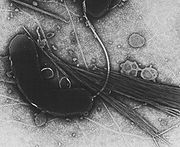
Cholera Bacteria Vibrio cholerae - Strains: El Tor
Discovery:1854 Broad Street cholera outbreak - John Snow - Reverend Henry WhiteheadTreatment Oral rehydration therapy
Antibiotics:Tetracycline - cotrimoxazole - erythromycin - doxycycline - chloramphenicol - furazolidone
Fluoroquinolones:norfloxacinOutbreaks Cholera Pandemics: First cholera pandemic - Second cholera pandemic - Third cholera pandemic - Fourth cholera pandemic - Fifth cholera pandemic - Sixth cholera pandemic - Seventh cholera pandemic
Other outbreaks: 1854 Broad Street cholera outbreak - 2007 Central Luzon hog cholera outbreak - 2007 Iraq cholera outbreak - 2008 Congo cholera outbreak - 2008–2009 Zimbabwean cholera outbreak - 2010 Haiti cholera outbreak Zimbabwean presidential election, 2008 and subsequent events
Zimbabwean presidential election, 2008 and subsequent eventsCandidates Robert Mugabe (ZANU-PF) · Morgan Tsvangirai (MDC-T) · Simba Makoni (Mavambo/Kusile/Dawn)(campaign) · Langton Towungana (independent)Events First round · Parliamentary election (constituency results) · Campaigning · Vote counting · SADC meeting · An Yue Jiang · Operation Mavhoterapapi · Second round · International reaction · Seventh Zimbabwean Parliament · Political negotiations · Cholera outbreakSee also Arthur Mutambara (MDC-M) · Emmerson Mnangagwa · Joint Operations Command · Movement for Democratic Change (MDC) · Zimbabwe African National Union – Patriotic Front (ZANU-PF) · Government of National Unity · Joint Monitoring and Implementation Committee · Sanctions against ZimbabweCategories:- History of Zimbabwe
- 2008 in Zimbabwe
- 2000s medical outbreaks
- Disasters in Zimbabwe
- Health in Zimbabwe
- Cholera outbreaks
- 2008 health disasters
- 2009 health disasters
- 2010 health disasters
Wikimedia Foundation. 2010.

